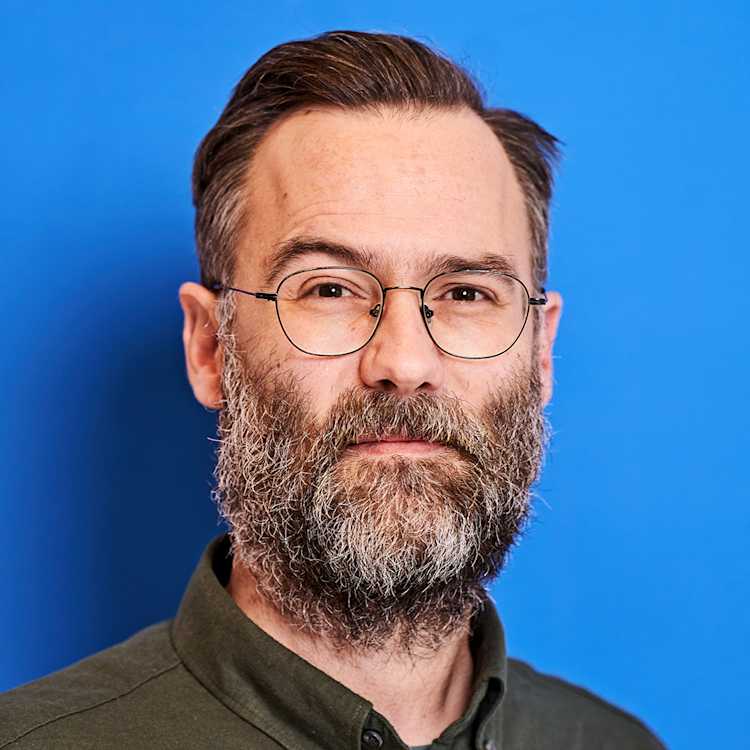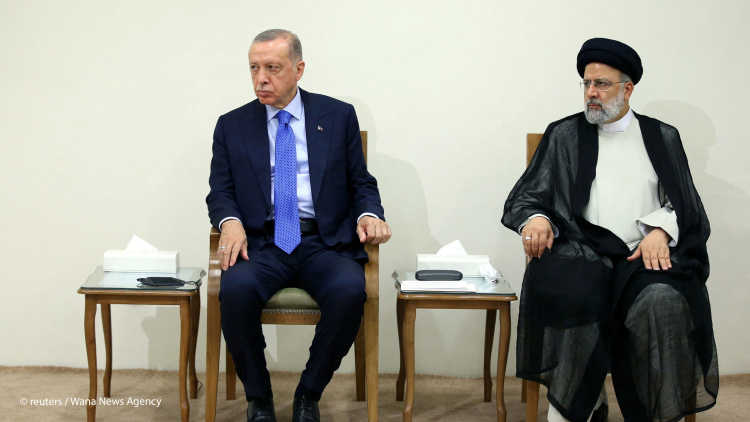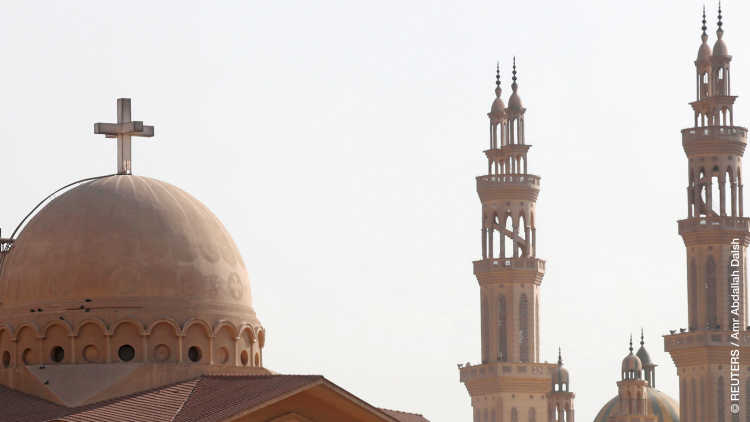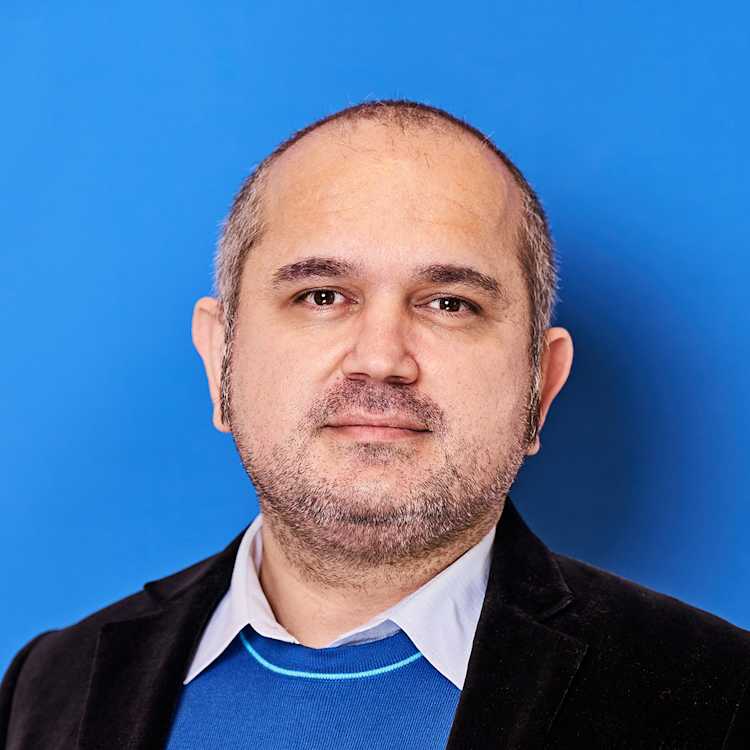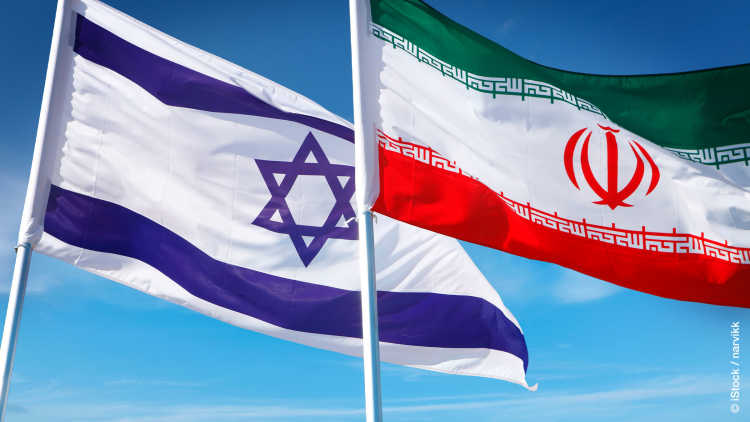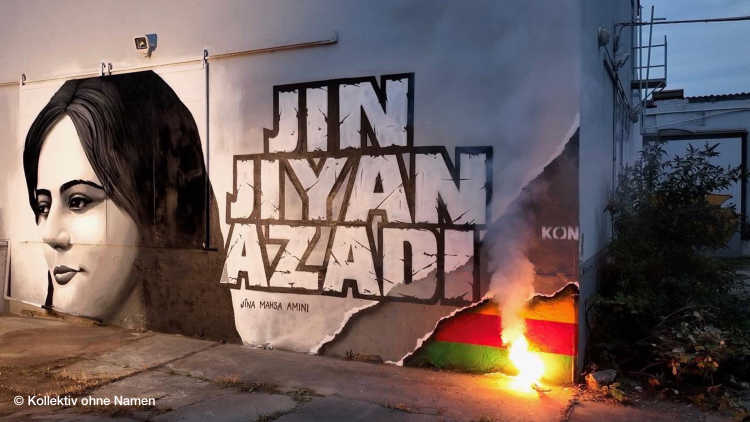- Home
- Publications
- GIGA Focus
- Non-State Actors and Autocratic Public Diplomacy: A Transregional View
GIGA Focus Middle East
Non-State Actors and Autocratic Public Diplomacy: A Transregional View
Number 6 | 2024 | ISSN: 1862-3611

Next to key global actors, Middle Eastern states have sought to make inroads into Africa of late. At the helm are Iran, Saudi Arabia, and Turkey, which despite being the region’s dominant middle powers struggle to compete with more potent international actors. To make up for such imbalances, they build on cultural and religious proximity with African societies in their public-diplomacy strategies.
Public diplomacy is a means to mobilise soft-power resources, including societal ones. Non-state actors thus gain in importance. Yet to the extent that autocracies integrate them in corresponding strategies – in the realm of education, for example – doubts arise about their independence.
Iran’s public diplomacy in Africa, notably regarding education, piggybacks on putative non-state actors. While presented to foreign audiences as non-governmental organisations – and often holding such legal status –, they are heavily dependent on and regulated by the state.
Saudi Arabia is a public-diplomacy pioneer in Africa. While it is aware of Iranian and Turkish educational successes, it is also the least active of the three in Africa’s educational sector nowadays. This reluctance to follow suit also springs from recent efforts to de-emphasise Islam.
Non-state actors have continued to play a crucial role in Turkey’s public diplomacy in Africa, with their activities, particularly in terms of education, predating state-led initiatives. However, since 2013 Turkey’s endeavours have increasingly become state-controlled, best visible in the establishment of new state institutions across Africa.
Policy Implications
Public diplomacy looms large in the Africa policies of Iran, Saudi Arabia, and Turkey, and non-state actors often form a key part of their corresponding strategies. This mirrors a general global trend currently playing out. Many actors involved in autocratic public diplomacy, however, are “non-state” only in name, being effectively state-controlled – including ones operating in Europe.
Autocratic Approaches to Public Diplomacy
Public diplomacy is part of the standard repertoire of states to further their foreign policy goals by communicating with international audiences. It is often used as a catch-all term for a plethora of different, mostly state-sponsored measures, ranging from educational and exchange programmes to the mediation of foreign policy via international broadcasting. The label was coined in the second half of the last century, superseding more unhandy denotations such as “information work.” These, in turn, were introduced to replace its original designation, which had come to be disavowed in the wake of World War II at the latest: namely, “propaganda.” While “public diplomacy” is widely used today, some scholars persistently highlight its specific origins, stating that in the end public diplomacy is merely “the modern name for white [i.e. transparent] propaganda directed chiefly at foreign publics” (Berridge 2022: 215).
This understanding, however, is rejected by a growing number of pundits and practitioners. Particularly the adherents of the “new public diplomacy” school maintain that today’s public diplomacy is fundamentally different from propaganda in that it features, for instance, two-way communication and multi-actorness (Melissen 2005: 12–14). The former is meant to imply that present-day states abstain from unidirectionally providing information to target audiences by instead engaging in dialogue with domestic and foreign publics; the latter suggests that modern public diplomacy is less hierarchical and state-centred but involves non-state actors too – almost on an equal footing with the state, they collaborate with public actors when reaching out to international audiences.
“New public diplomacy” is a popular approach that, beyond doubt, is rewarding when discussed against the backdrop of liberal democracies. Yet, things get complicated in the case of its cut-and-dried application to autocratic practices. Moreover, they even turn risky when, for instance, local policymakers equate autocratic (if non-state) public-diplomacy actors operating in the European Union with European peers active abroad.
For one thing, autocracies are not particularly well-known for engaging in earnest dialogue – meaning one that is open-ended and conducted at eye level. Rather, their public-diplomacy agencies only pretend to converse with foreign audiences while they barely even bother to feign dialogue with domestic ones. For another, non-state actors active in autocratic public diplomacy – to the extent that they are indeed “non-state” in the true sense of the word – are usually controlled by the state in question, be they non-governmental organisations, media outlets, or cultural entrepreneurs, to name but a few examples. Given current legal provisions and the vast toolbox of coercive means available to autocracies, there are plenty of ways for incumbents to interfere with, and police, non-state actors – including those operating abroad. In other words, autocratic public diplomacy does involve non-state actors, but the relationship between them and the state is strictly hierarchical, and the activities carried out are commonly pre-determined by the latter.
Another source of criticism – that is, besides the “new public diplomacy” school’s unreflective adoption of certain assumptions concerning autocracies – arises with respect to underlying conditionality. It has been suggested that two-way communication and the collaborative, non-hierarchical nature of the public-diplomacy efforts jointly engineered by state and non-state actors are preconditions for their success (Melissen 2005: 14). This claim echoes a related proposition made by proponents of the concept of “soft power,” which the “new public diplomacy” literature heavily draws on, according to which only liberal values and democratic institutions can attract and allure other audiences (Gallarotti 2011: 33). Neither assumption, however, is particularly robust, as the public-diplomacy performances both past and present of the Islamic Republic of Iran, the Kingdom of Saudi Arabia, and the Republic of Turkey in Africa make clear.
Middle Eastern Public Diplomacy in Africa
Africa has been at the centre of global great and middle powers’ renewed attention for quite some time now. Their attempts to make inroads into Africa’s economic and political spheres have, indeed, grown to such an extent of late that observers have begun comparing their advances with those of the late nineteenth century, when “European powers raced to grab as much as they could” (Rosenthal 2023). Whether such comparisons hold up or not, they do imply stiff competition for influence and profits, with great powers such as China potentially having greater pull than Middle Eastern states by virtue of the sheer extent of the material resources the former have at their disposal. On this account, the public diplomacy of Iran, Saudi Arabia, and Turkey seeks to take advantage of commonalities prominently shared with large swathes of Africa’s different societies – notably, adherence to the Islamic faith. After all, at least 500 million Muslims live in Africa today – more than in the entirety of the Middle East.
This is not to say that Iran, Saudi Arabia, and Turkey confine their Africa policies to the realm of public diplomacy. The latter is, rather, only one strategy to gain a foothold on the continent, but a crucial one nonetheless. Interestingly, there are also important differences between and within the past and present public-diplomacy efforts of Iran, Saudi Arabia, and Turkey vis-à-vis African audiences, particularly concerning the strategic use of non-state actors in those fields of activity that interweave education, culture, and religion.
Iran’s Public Diplomacy: Non-State Actors and Regime Discord
Iran has long used public diplomacy to promote its revisionist foreign policy and revolutionary Shiism. It is worthy of mention in this context that the concept of “soft power” has been highly popular within Iranian policy and academic circles, which consider public diplomacy a prime means of both mobilising the country’s soft-power resources and communicating its Islamist-globalist and, to a lesser extent, Persian-nationalist civilisation and culture to international audiences. Hence, the literature on soft power in Iran (both studies authored by local scientists and translations into Farsi) has increased significantly in the last two decades, as has the number of public-diplomacy actors abroad – particularly in Africa, which has become crucial to Iran’s foreign policy accordingly.
Among the cluster of Iranian public-diplomacy actors, non-state ones form an integral part. This is especially true of Iranian-sponsored educational establishments, whose numbers in Africa have expanded since the beginning of the new millennium (see Figure 1 below). There is also a structural reason underlying this development: notable is the fact that Iran’s political system allows for regime factionalism to thrive and that those holding eminent positions in the state hierarchy may not necessarily be the most resourceful and indeed powerful in swaying its foreign policy trajectory.
By way of example, Iran’s executive branch (government and presidency) does not possess many public-diplomacy resources, nor can it exclusively influence – let alone control – the regime’s overall outreach endeavours. As it happens, the Ministry of Foreign Affairs only features a single-person department for public diplomacy (in effect, the Ministry’s spokesperson), whose work is largely confined to media affairs. Conversely, a large group of public-diplomacy actors exist who operate, by their own and their legal definition, outside the state apparatus while maintaining close ties in practice with the Office of the Supreme Leader in particular. The recent proliferation of (ostensibly) non-state actors in the field has, then, compelled the Iranian state to regulate relationships with and among the latter, including by establishing organisational, bureaucratic, and financial constraints and incentives. The mode of such oversight, while deliberately non-transparent in nature, is also reflective of regime power dynamics.
Figure 1. Middle Eastern Educational Establishments in Africa

Source: MPEX (2024).
Notes: “Educational establishments” are here defined as premises for educative and research purposes, including primary, secondary, and tertiary education; vocational, language, and cross-cultural training; and religious instruction. Only establishments with a sustained record of material support (funds, equipment, management, staff, construction, or rental of educational facilities) from Iran, Saudi Arabia, and Turkey are included.
The Islamic Culture and Relations Organisation (ICRO) is one emblematic example of the confusing relationship between state and non-state actors in this country context. Per its own charter, ICRO conducts “self-reliant cultural diplomacy” (ICRO n.d.), running nine local branches in Africa to this end. In technical terms, the organisation is granted independent legal status. However, it is also tasked with regulating and coordinating Iran’s public-diplomacy actors abroad. Even more paradoxical given its legal standing, it not only appoints cultural attachés to Iran’s embassies, including in Africa, but is also administratively tied to the Ministry of Culture and Islamic Guidance and partially funded from the state budget. In fact, ICRO is heavily influenced and controlled by the Supreme Leader: Out of the 16 members of ICRO’s Executive Council, 11 are directly or indirectly appointed by him. Also, ICRO’s head is nominated by the Minister of Culture but can only assume office following the approval of the Executive Council and, importantly, the Supreme Leader.
The blurring of boundaries here between state and non-state actors is also evident concerning other key forces in the field of (religious) education abroad. In Africa, three organisations stand out: the Al-Mustafa International University (MIU), the Ahl-e Bayt World Assembly (ABWA), and the Computer Research Center of Islamic Sciences (CRCIS). MIU and ABWA both run branches across Africa and cooperate with local universities, schools, and mosques. They also offer scholarships to African students for studying in Iran. CRCIS, in turn, operates predominantly from Iran, providing religious educational material as well as digital consultancy to local Muslim communities. Again, all three organisations are legally registered as NGOs. Yet most of their leading representatives, including at the level of directors, are appointed by the government or, notably, the Supreme Leader. Likewise, state funding for these and other organisations has increased exponentially over the last decade, even triggering discontent among some rival regime factions (Donya-e-Eqtesad 2017).
These examples indicate the Iranian state’s strong grip over non-state actors, including purely nominal ones: it effectively exerts multiple layers of control to police their activities and ensure their compliance in helping push its own public-diplomacy agenda. Vital players inside the regime – chiefly the Office of the Supreme Leader – have sought to prevent such public-diplomacy organisations from becoming too influential and independent. MIU, for instance, resulted from the merger of two pre-existing bodies: the International Centre for Islamic Studies and the Organisation of Schools and Seminaries Abroad, respectively (Jamaran.ir 2018). In 2009, however, the Supreme Leader ordered their amalgamation to improve their effectiveness and, importantly, to ensure greater conformity with the state – or rather, the dominant regime faction headed by himself.
Saudi Arabia’s Reluctant Relationship with Non-State Actors
Saudi Arabia not only has a long record of employing public-diplomacy tools to target strategic audiences; it has also become renowned more recently for running a well-oiled public-diplomacy machine to polish its tarnished image and facilitate the implementation of its ambitious reform programme “Vision 2030.” While corresponding measures in support of the latter are usually associated with massive investment in sports or megacity projects such as Neom, earlier public-diplomacy approaches heavily built on portraying the Kingdom as the linchpin of Islam and Muslim civilisation.
Such was the case during the first period of heightened engagement in Africa when, in the wake of the Six-Day War, Saudi Arabia sought to eliminate Israel’s presence on the continent. To this end, the government of King Faysal (1964–1975) appealed to Africa’s Muslim-majority countries for Islamic solidarity, requesting their severing of diplomatic ties with Tel Aviv. To further its influence with African societies and politics, the Kingdom also funded and oversaw the formation of Islamic centres and universities, beginning with the founding of the King Faysal Islamic Centre in N’Djamena, Chad, in 1972 (see Figure 1 above). Such measures were seconded by the provisioning of support for Muslim missionaries – including non-Saudis such as Iraqi national Muhammad al-Sawwaf, whom Faysal repeatedly ordered to spread daʿwa (“invitation to Islam”) in Africa (al-ʿAwhali 1972) – and by bankrolling the activities on the continent of Saudi charities or international (yet Saudi-controlled) NGOs such as the Muslim World League.
The spreading of Wahhabism – the puristic and highly conservative interpretation of the Hanbali school of Sunni jurisprudence prevalent in the Kingdom – with the aid of such non-state actors was intended to win over Africa’s different societies. Compared to other world regions, however, the continent was not a focal point of Saudi proselytisation. Rather, the diffusion of Wahhabism there was mainly boosted by African migrants returning to their countries from the Kingdom after they had worked or studied there for a while (see Figure 2 below) – often as funded by Saudi scholarships, another traditional public-diplomacy tool. This first period of heightened Saudi engagement in Africa proved ultimately short-lived, petering out during the reign of Faysal’s successor, King Khalid (1975–1982).
Figure 2. Inbound Students from Africa to the Middle East

Source: MPEX (2024).
Sustained efforts to engage with Africa only gained renewed momentum following the enthronement of King Salman in 2015. Unlike during the reign of Faysal, however, Wahhabi proselytisation assumed no strategic role this time, except in a few countries such as Nigeria where Iran had previously gained influence with local Shia populations. Instead, the Kingdom used traditional techniques of statecraft to upgrade bilateral relations, as backed up by more classical public-diplomacy means that could almost do without non-state actors.
Interestingly, this strategic path was embarked on despite the leadership’s knowledge about the successful use of non-state actors – particularly in the field of education – by Iran and Turkey, Saudi Arabia’s main regional contenders. For instance, in a prime-time television chat show with Minister of State for African Affairs Ahmad Qattan, host ʿAbdallah al-Mudaifar pointed to the scores of Iranian and Turkish educational establishments in Africa in stating:
So it is said that Saudi Arabia is absent from the cultural and educational realm in Africa, which is why the Saudi role in Africa has declined over the past few years.
To which Qattan responded:
I don’t want to say that Saudi Arabia [or its role] is declining or absent. […] After 1972 we did not have a clear strategy towards the African continent except for Islamic solidarity, while today we do. (Khalijiyya 2021)
Although Qattan failed to elaborate on what that strategy consists of, it seems unlikely that the Kingdom will try to build up its educational establishments on the African continent, whose numbers are, as noted, dwarfed by those of Iran and Turkey alike. Saudi foreign policy has become inherently state-centred, and there are several factors militating against the inclusion of non-state actors in its public diplomacy.
First, those operating in the realm of education, or daʿwa for that matter, have proven exceptionally difficult to control, and many groups previously active in the field such as the Ikhwan or Sahwa movements turned out to be a liability or even a direct menace to Saudi Arabia’s ruling dynasty. Second, new Crown Prince and de facto ruler Muhammad bin Salman impugns his predecessors’ endorsement of Islamism but instead “believes the regime should have relied on nationalism, rather than religion, as a means of ensuring its survival” (Haykel 2023). Lastly, given its relative abundance of hydrocarbon revenues, the Kingdom does not need non-state actors to the same extent its Iranian and Turkish competitors do. Both more recently and under Faysal, it has often relied on transactional relationships with African states, providing material incentives to local incumbents to meet its targets.
Turkey’s Changing Public Diplomacy: From Delegation to State Control
Turkey’s pivot to the African continent under the AKP’s (Adalet ve Kalkınma Partisi) over two-decade-long rule (2002–present) has garnered considerable attention. While comparatively new to public diplomacy, the latter has become an essential vehicle in communicating Turkey’s desired image as a brotherly alternative to the former European colonial powers, aiming to win therewith Africans’ hearts and minds. A central aspect of this engagement has been the role played by non-state actors, such as the Gülen movement, which initially spearheaded Turkey’s presence on the continent. Turkish non-state actors, in fact, began engaging with Africa even before the official 1998 “Opening Up to Africa” policy. Education was thereby a primary channel for establishing a foothold on the continent, with the first Gülen-affiliated schools opening in Morocco (1994), Senegal (1997), and Kenya and Tanzania (1998) (see Figure 3 below).
Thereafter, the network surrounding Islamic cleric Fethullah Gülen established over 120 educational institutions across Africa, oftentimes preceding the opening of official Turkish diplomatic missions. The movement’s schools, which became known locally as “Turkish schools,” hence often served as unofficial embassies, fostering influential relationships with local elites and providing their children with scholarships enabling them to study in Turkey. These networks extended beyond education, incorporating the trade association TUSKON (Türkiye İşadamları ve Sanayiciler Konfederasyonu) or the humanitarian organisation Kimse Yok Mu. Collectively, these efforts not only enhanced Turkey’s image but also facilitated deeper economic and diplomatic ties with partners across the continent. The Gülen movement was thus considered to have been the unofficial yet primary actor in Turkey’s public-diplomacy efforts in Africa until its fallout with the AKP in 2013 (Çevik 2022: 168–169). Consequently, Ankara’s initial approach to the continent has been recognised as a prime example of collaboration between state and non-state actors (Heibach and Taş 2024).
However, the dynamics of Turkish public diplomacy shifted considerably following the rift between the AKP and the Gülen movement, as coinciding with the onset of Turkey’s increasing democratic backsliding. The fallout ultimately culminated in the July 2016 coup attempt, which the Turkish government attributed to the movement, subsequently labelling it as the terrorist organisation Fethullahçı Terör Örgütü (FETÖ). This marked a critical juncture, highlighting the pivotal role of the Gülen movement in Turkey’s public diplomacy and revealing the state’s insufficient allocation of resources to this domain previously (Çevik 2022: 169). In response, decision-makers invested heavily in (re)invigorating the Turkish public-diplomacy infrastructure accordingly, best visible in the proliferation of state-funded institutions hereafter.
Figure 3. The Evolution of Turkish Educational Outreach in Africa

Source: MPEX (2024).
Notes: In the MPEX dataset, educational establishments were only counted as separate entities when they had individual addresses or telephone numbers. Accordingly, these numbers might vary from official TMF ones.
In Africa, this shift included the establishment of 11 Yunus Emre Institute cultural centres between 2010 and 2022, seven of which were opened post-2016. The expansion of the international broadcaster Anadolu Agency’s reach to nine African countries, supported by a network of freelance journalists in 28 additional ones, as well as the 2023 launch of the TRT Afrika station within the scope of Turkish public broadcaster TRT’s offerings further exemplify this change. While scholarship opportunities were initially also provided by the Gülen movement, the government-funded body Türkiye Scholarships increased its related efforts, leading to a substantial rise in the number of African students studying in Turkey (see Figure 2 above). Most noteworthy in the field of education, however, is the establishment of the Turkish Maarif Foundation (TMF) in June 2016 as “the sole entity authorized to provide educational services abroad” (TMF n.d.), which can be considered linked to the government’s wish to curb the Gülen movement’s influence on the continent. Following the 2016 coup attempt, the Turkish government and its representatives in Africa thus made substantial efforts to convince their counterparts there to close down or transfer Gülen-affiliated schools to the TMF. Between 2016 and 2021, the latter would open over 50 schools across the continent (see Figure 3 above).
The adoption of a presidential system following the 2017 constitutional referendum and the 2018 general election further solidified the “re-statisation” (Heibach and Taş 2024) of Turkey’s public diplomacy and foreign policy. Following this transition, political authority was now substantially centralised within the executive branch, thereby eroding democratic checks and balances and fostering a shift towards autocratic governance. This turn of events saw the Turkish state increasingly taking direct control of initiatives previously managed by or carried out in collaboration with non-state actors. Public diplomacy, once a domain seeing significant non-state actor involvement, thus became increasingly presided over by state institutions.
Despite this increased state control, some Turkish non-state actors still remain active in Africa. Faith-based NGOs such as the Aziz Mahmud Hüdayi Foundation, which also operates in the educational sphere, continue to play a role. These organisations often share a similar worldview to Turkey’s political elites and receive support for their activities in Africa, as previously once enjoyed by other non-state actors like the Gülen movement (Güner 2021: 2). These actors, hence, continue to complement Turkish public-diplomacy efforts in Africa, yet only those in close proximity to the government might be able to reap the benefits of this synergy going forwards.
Assessing Non-State Actors in Autocratic Public Diplomacy
Iranian, Saudi, and Turkish public-diplomacy efforts reveal that the idea of autocratic allurement should not be discarded outright. Rather, their related endeavours have significantly contributed to the attainment of their respective goals in Africa. These three country cases also attest to the growing importance of non-state actors in the pursuit of autocratic public diplomacy. In a nutshell, non-state actors have played a key role in Iranian public diplomacy, although the state has been largely successful in controlling and utilising them to further its agenda. Saudi Arabia, too, has previously made use of non-state actors to further its influence in Africa, though less extensively than its Middle Eastern rivals and mostly for the sake of Wahhabi proselytisation – a policy that has been downgraded of late. Turkey’s success in taking its place as a significant actor in Africa was greatly facilitated by non-state actors. However, political conflicts with them and increasing autocratisation have since seen the state’s tighter control over both non-state actors and the public-diplomacy apparatus at large.
Autocratic public diplomacy involves a broad range of non-state actors. These can be nationals or legal entities registered in a given autocracy, as well as foreign citizens or institutions working on behalf of the latter. They can comprise individuals, charities, cultural associations, religious organisations, educational establishments, international broadcasters, and even international NGOs. They may be “non-state” only in name, being in effect quasi-state or para-state actors; or, they may be bona fide non-state actors – albeit ones controlled by an autocracy or otherwise inclined to cooperate with the latter on the grounds of shared goals or material incentives.
The often-blurred boundaries between state and non-state actors in autocracies are crucial to acknowledge. In fact, “non-state actors” are still widely “romanticised” in both theory and practice, to paraphrase the late Fred Halliday. Even though isolated Russian or Chinese entities operating in security-sensitive sectors have recently been put on a watchlist by European authorities, alleged non-state actors from lesser powers, including from the Middle East, often stay under the radar, particularly if their activities fall under public-diplomacy efforts.
This is not to demonise non-state actors in general, nor those involved in the fields of education or cultural exchange. Normally their work is of great benefit socially and culturally, and corresponding organisations are frequently run by people in the diaspora who deliberately cut ties with their home country’s incumbent regime. In short, non-state actors, whether domestic or foreign, must not be placed under general suspicion. Yet in some cases European authorities and cultural agencies are well-advised to explore the actual independence of a given non-state actor when, for instance, considering joint endeavours or assessing eligibility for public benefits. Namely, by monitoring the extent to which its political objectives overlap with those of the home-country regime; the extent to which its members are affiliated with autocratic organisations there; and, the extent to which the latter can leverage its behaviour via funding or transnational means of repression.
Note
This work was supported by the German Research Foundation (Deutsche Forschungsgemeinschaft) [grant no DFG, 463159331].
Footnotes
References
Al-ʿAwhali, Muhammad (1972), Rasa’il min jalala al-Faysal li-ʿadad ru’asa al-duwal al-ifriqiyya, in: al-Riyadh, 30 March.
Berridge, Geoff R. (2022), Diplomacy: Theory and Practice, 6th ed., Cham: Palgrave Macmillan.
Çevik, Senem B. (2022), “The Voice of the Voiceless”: Turkey’s Public Diplomacy in Africa, in: Elem Eyrice Tepeciklioğlu and Ali Onur Tepeciklioğlu (eds), Turkey in Africa: A New Emerging Power?, New York: Routledge, 167–181.
Donya-e-Eqtesad (2017), Labi-haye posht-e parde baraye 300 radif boudje-ye porhashiye, 11 December (i.e. 20 Azar), accessed 12 September 2024.
Gallarotti, Giulio M. (2011), Soft Power: What It Is, Why It’s Important, and the Conditions for Its Effective Use, in: Journal of Political Power, 4, 1, 25–47.
Güner, Ezgi (2021), NGOization of Islamic Education: The Post-Coup Turkish State and Sufi Orders in Africa South of the Sahara, in: Religions, 12, 1, 1–22.
Haykel, Bernard (2023), Saudi Arabia’s New Nationalism, in: Project Syndicate, 29 September, accessed 12 September 2024.
Heibach, Jens, and Hakkı Taş (2024), Beyond the Soft–Hard Power Binary: Resource Control in Turkey’s Foreign Policy Towards Sub-Saharan Africa, in: Journal of Balkan and Near Eastern Studies, 26, 3, 311–326.
Jamaran.ir (2018), Negahi be sakhtar va ahdaf-e Al-Mustafa dar goft-o-goo ba raeis va moavenan-e in nahad, 9 December (i.e. 18 Azar), accessed 12 September 2024.
ICRO (n.d.), Asasname eslah shode-ye sazman-e farhang va ertebatat-e eslami, accessed 12 September 2024.
Khalijiyya (2021), Fi al-sura, 2 March, accessed 12 September 2024.
Melissen, Jan (2005), The New Public Diplomacy: Between Theory and Practice, in: Jan Melissen (ed.), The New Public Diplomacy: Soft Power in International Relations, Basingstoke: Palgrave Macmillan, 3–27.
MPEX: Explaining Middle-Power Engagement in External Regions (2024), in: GIGASet, accessed 12 September 2024.
Rosenthal, Jonathan (2023), There Is a New Scramble for Africa: Foreign Meddling Is Spreading Chaos and Tyranny, in: The Economist, accessed 18 May 2024.
TMF (n.d.), Establishment Purpose, Turkish Maarif Foundation, accessed 25 June 2024.
Editor GIGA Focus Middle East
Editorial Department GIGA Focus Middle East
Regional Institutes
Research Programmes
How to cite this article
Heibach, Jens, Mira Demirdirek, and Hamid Talebian (2024), Non-State Actors and Autocratic Public Diplomacy: A Transregional View, GIGA Focus Middle East, 6, Hamburg: German Institute for Global and Area Studies (GIGA), https://doi.org/10.57671/gfme-24062
Imprint
The GIGA Focus is an Open Access publication and can be read on the Internet and downloaded free of charge at www.giga-hamburg.de/en/publications/giga-focus. According to the conditions of the Creative-Commons license Attribution-No Derivative Works 3.0, this publication may be freely duplicated, circulated, and made accessible to the public. The particular conditions include the correct indication of the initial publication as GIGA Focus and no changes in or abbreviation of texts.
The German Institute for Global and Area Studies (GIGA) – Leibniz-Institut für Globale und Regionale Studien in Hamburg publishes the Focus series on Africa, Asia, Latin America, the Middle East and global issues. The GIGA Focus is edited and published by the GIGA. The views and opinions expressed are solely those of the authors and do not necessarily reflect those of the institute. Authors alone are responsible for the content of their articles. GIGA and the authors cannot be held liable for any errors and omissions, or for any consequences arising from the use of the information provided.



